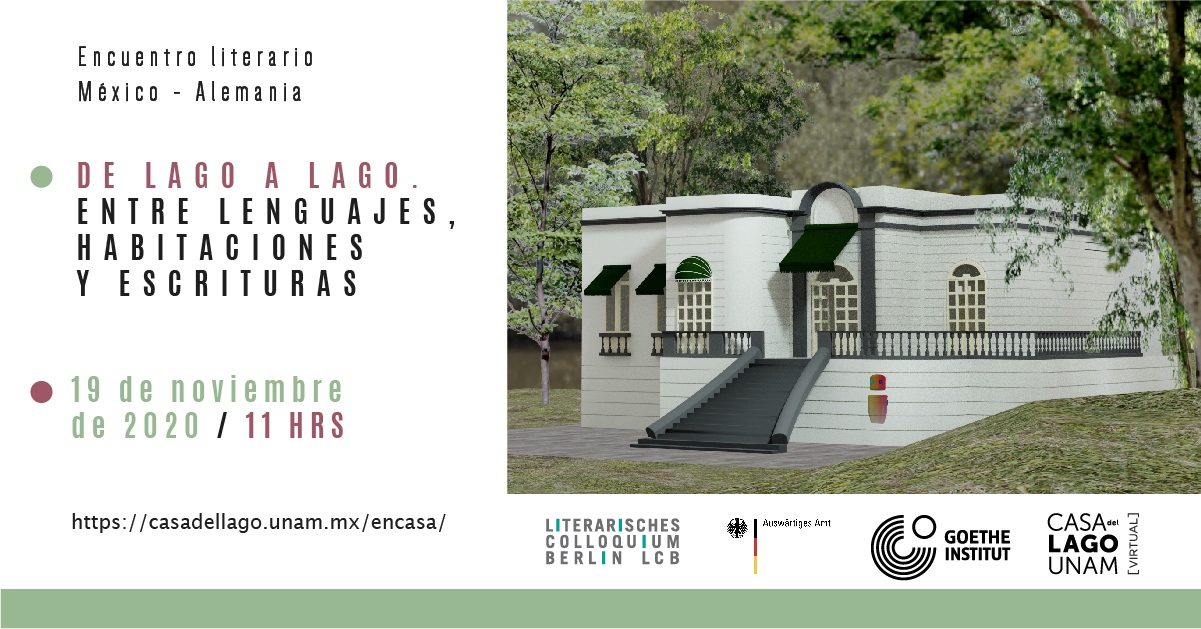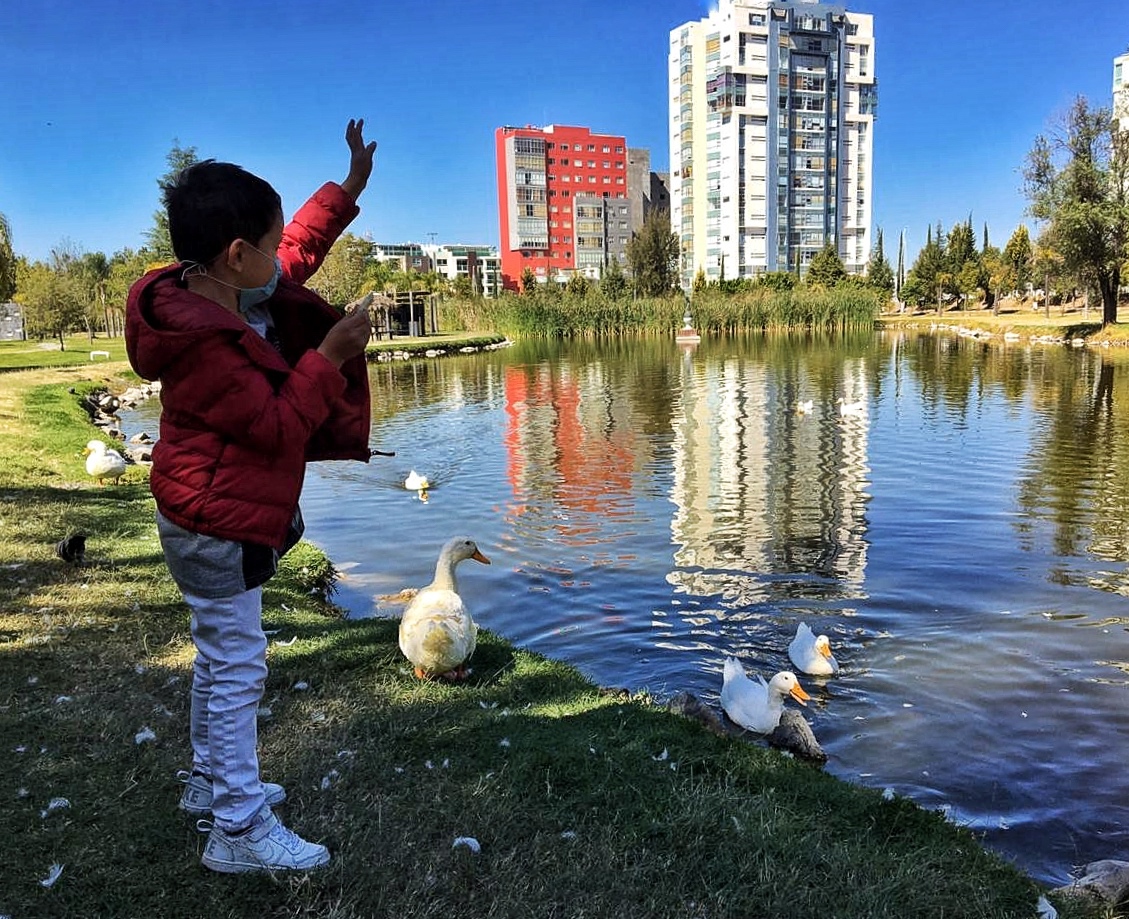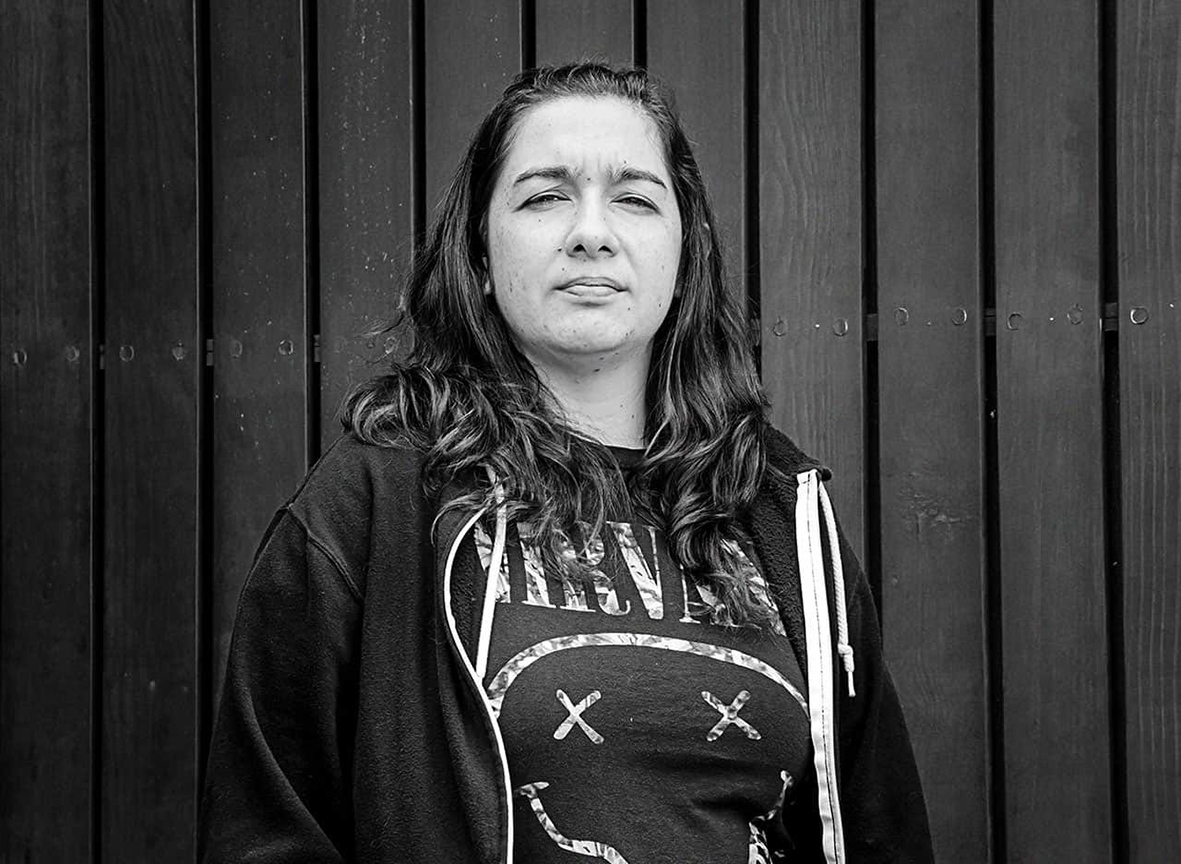Plumas de pato
Jorge tiene cinco años y está de visita en Puebla. Estefanía, su madre, lo ha traído en auto desde Cuernavaca para que se quede una semana con su tía Pola. Es la primera vez que pasa tanto tiempo lejos de casa, de sus padres, de su hermana mayor y de sus gatas, pero Estefanía necesita que alguien se haga cargo de su hijo menor por una temporada, y a Jorge no le viene mal el cambio de aires.
La pandemia lo complica todo, nos dice, su vocecita indignada porque llegamos al parque y ningún niño acepta jugar con él. Tarda un rato en resignarse y comienza entonces a recolectar plumas blancas de pato, esparcidas sobre el césped en torno al pequeño lago del parque. Ducks, dice, señalando a las aves que nadan y graznan. Birds, squirrel, butterflies, aúlla cada vez que las criaturas aparecen entre los árboles. Lo hace porque está en esa edad en la que los niños gustan de presumir a gritos sus conocimientos, pero también porque su tía está tratando de enseñarle inglés, o más bien, trata de que no olvide el poco que logró aprender antes de la pandemia, cuando todavía iba a la escuela.
Jorge tiene nueve meses sin pisar un salón de clases, y cinco que no recibe ningún tipo de educación formal, pues sus padres ya no pueden pagar el colegio privado al que asistía, de modo que ahora Jorge recibe clases de su madre, de su tía Pola, de esta tía honoraria que soy yo, sólo por esta tarde, y a veces de la televisión, donde el gobierno mexicano transmite desde abril los contenidos del sistema nacional de educación pública, en cadena nacional.
Miro a Jorge recolectar plumas de pato y luego acercarse a un grupo de niñas. Las plumas se convierten en joyas, en monedas, en copos de nieve que caen sobre el césped, y yo pienso en los niños que no tienen tanta suerte como Jorge, que no pueden decir pato en inglés, ni tienen una tía que los lleve al parque, ni padres que hacen todo lo humanamente posible para evitar que se rezague. Pienso en esos cientos de miles -tal vez, horror, millones- de menores mexicanos que no han podido proseguir su educación debido al cierre de las escuelas públicas, que no tienen televisión en casa, o siquiera luz eléctrica; niños y niñas que pasan los días sin supervisión alguna, o que han debido comenzar a trabajar para ayudar a la economía doméstica, y me pregunto -aunque no tengo hijos, pero considero que todos los niños del mundo son nuestra responsabilidad compartida- qué vamos a hacer para asegurarles un futuro a todos los que están creciendo en esta época.
Entenfedern
Jorge ist fünf Jahre alt und zu Besuch in Puebla. Seine Mutter Estefanía hat ihn mit dem Auto von Cuernavaca hierher gebracht, damit er eine Woche bei seiner Tante Pola verbringt. Es ist das erste Mal für ihn so lange weg von zuhause, von seinen Eltern, der großen Schwester, den Katzen. Aber Estefanía braucht jemanden, der sich eine Zeit lang um ihren Jüngsten kümmert und Jorge tut der Tapetenwechsel auch mal ganz gut.
Die Pandemie macht alles schwierig, sagt er, und in seiner Kinderstimme liegt Empörung, denn als wir im Park ankommen, will kein anderes Kind mit ihm spielen. Wenig später ist sein Ärger verflogen und er beginnt, auf der Wiese, die den kleinen Teich umgibt, Entenfedern aufzusammeln. Ducks, sagt er und zeigt auf die Vögel, die schnatternd auf dem Teich schwimmen. Birds, squirrel, butterflies, gröhlt er, wenn er eines der Tiere in den Bäumen erspäht. Das ist gerade dran, denn in seinem Alter muss man sein Wissen lauthals der Welt kundtun und außerdem versucht die Tante ihm gerade ein bisschen Englisch beizubringen, oder, besser gesagt, sie ist bemüht, dass er das wenige, das er vor der Pandemie gelernt hatte, als er noch zur Schule ging, nicht vergisst.
Jorge hat neun Monate kein Klassenzimmer mehr von innen gesehen, seit fünf Monaten erhält er keine geregelte Schulbildung mehr, denn seine Eltern können sich die Privatschule, die er besuchte, nicht mehr leisten, so dass er nun Unterricht von seiner Mutter und seiner Tante Pola bekommt und von seiner Wahltante, das bin ich diesen einen Nachmittag. Manchmal verfolgt er auch den Unterricht im mexikanischen Fernsehen, über das die Regierung seit April Lerninhalte des Nationalen Schullehrplans bringt.
Ich sehe wie Jorge Entenfedern sammelt und sich einer Gruppe von Mädchen nähert. Die Federn werden zu Schmuck, zu Münzen, zu Schneeflocken, die auf die Wiese rieseln, und ich denke an die Kinder, die nicht solches Glück haben wie Jorge, die nicht ‚Ente‘ auf Englisch sagen können und auch keine Tante haben, die mit ihnen in den Park geht, und keine Eltern, die alles Menschenmögliche tun, damit das Lernen ihrer Kinder nicht stagniert. Ich denke an die Hunderttausenden – vielleicht schrecklicherweise gar Millionen – von Minderjährigen in Mexiko, deren Bildung aufgrund der Schließung der staatlichen Schulen zum Erliegen gekommen ist, die zuhause kein Fernsehen, ja nicht mal Strom haben, Jungen und Mädchen, die völlig unbeaufsichtigt ihre Tage verbringen oder die nun auch arbeiten müssen, damit die Familie ein Auskommen hat, und ich frage mich – selbst zwar kinderlos, doch der Ansicht, dass Kinder unser aller Aufgabe sind – was wir tun werden, um allen, die in diesen Zeiten aufwachsen, eine Zukunft bieten zu können.
Übersetzung: Lea Hübner
Duck feathers
Jorge is five years old and he is visiting Puebla. Estefanía, his mother, drove him from Cuernavaca so that he could spend a week with Aunt Pola. This is the first time he is away from home, his parents, his older sister, and his cats, but Estefanía needed someone to watch her youngest son for a while, and the change in scenery would do him good.
“The pandemic makes things hard,” he says in his little voice, outraged because we came to the park and none of the children want to play with him. He takes his time to accept the situation, but ultimately starts to pick up some white duck feathers scattered around the grass surrounding the lake at the park. “Ducks,” he says in English, pointing at the birds swimming and quacking. “Bird!” “Squirrel!” “Butterfly!” He says something every time he catches a glimpse of an animal among the trees. He does so not only because he is going through that phase when children like to share their knowledge aloud, but also because his aunt is teaching him English―or rather trying not to let him forget what he had learned before the pandemic, when he used to go to school.
It’s been nine months since Jorge set foot in a classroom, and five months since he got any formal schooling at all, since his parents can no longer pay for the private school he used to go to. That is why Jorge is being homeschooled by his mother, his Aunt Pola, me―the Honorary Aunt for the afternoon―and sometimes the TV, since the Mexican government started to broadcast educational content from the public school system last April.
I watch Jorge picking up the duck feathers and walking towards a group of girls. Those feathers become jewelry, coins, and snowflakes falling on the grass. That makes me think of the children who aren’t as fortunate as Jorge, who don’t know how to say “duck” in English and don’t have an aunt to take them to the park, or parents who do everything that is humanly possible so that their kids won’t lag behind at school. I think of the hundreds of thousands, perhaps millions of Mexican children who, unfortunately, have not been able to continue their education due to public school closures, who don’t have a TV at home―or even electricity. These boys and girls spend their days unsupervised, or have started working to help at home. Even though I don’t have children, I think of all the children in the world as our shared responsibility. What will we do to ensure the future of these children who are growing in these times?
Translation: Rafa Lombardino
Share
-
19 Donnerstag
18:00 UhrLiteratur von See zu See – Mexiko-Stadt / Berlin
Gespräche über Sprachen, Räume und Schreibweisen
Mit Verónica Gerber Bicecci, Juliana Kálnay, Isabelle Lehn, Inger-Maria Mahlke, Fernanda Melchor, Guadalupe Nettel, Mithu Sanyal und Isabel Zapata
Veranstaltungen mit Fernanda Melchor
2020
November












